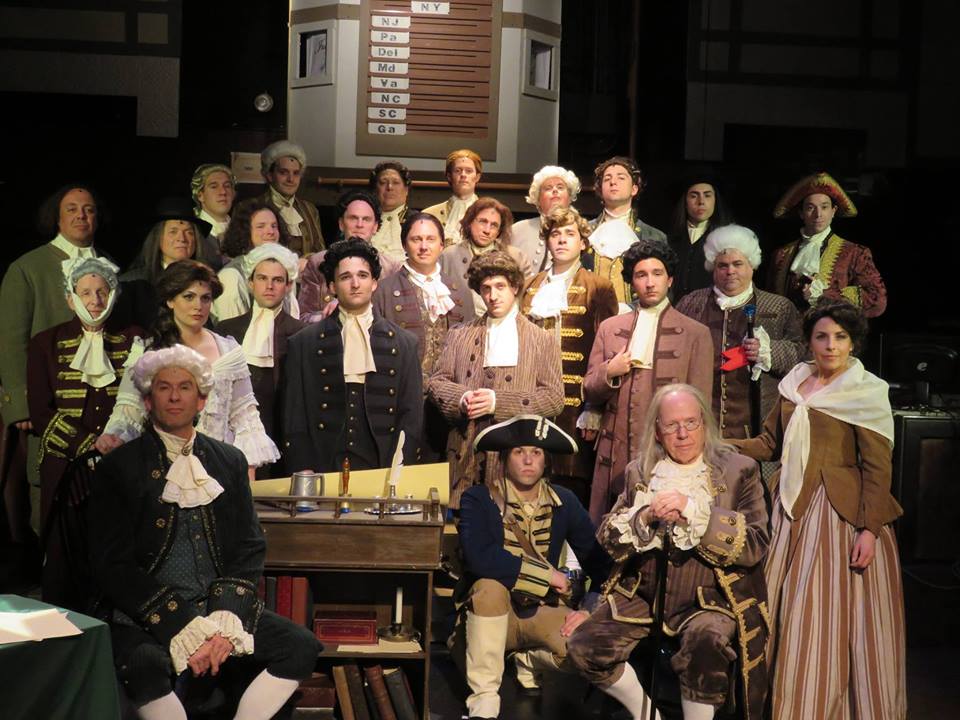The secretary of the second continental congress will now take the attendance. Actor Russell Silber, playing the congressional secretary, present with TheatreBloom as the third installment of Inside Independence Hall gets underway, and the labored debate for the vote on independence continues at Toby’s Dinner Theatre in their production of 1776.
If you could give us an introduction to yourself, tell us a little about where we might have seen you in the area on stage over the last year, we’ll get started.

Russell Silber: I’m Russell Silber and I play Charles Thomson, the secretary in 1776. In the last year or so? Let’s see…I understudied over at Imagination Stage in their production of 101 Dalmatians back in December. I didn’t get to go in but I got to play with the puppets and that alone made the experience worthwhile. They had these big, full-bodied back-pack puppet rigs which I enjoyed the challenge of learning to handle. Very much like The Lion King. The concept for the show was that all the Dalmatians, and other dogs as well, were people in costumes. For the people characters we had the big Julie Taymor style costume rigs which made them enormous so they were taller than the dogs. I understudied Chris Rudy in that show, who is currently in 1776 with me, so it’s a nice small little world of DC Theatre.
I did the Hope Operas with Steve Custer in October, and I’m a company member with Pallas Theatre Collective so last August I was in The Fall of the House of Usher with them. And I think before that was Bat Boy at 1st Stage. I was the track that does Rick, you know the jerk boyfriend with the rap song? And Pan who has that wonderfully bizarre song in act two. Hah, I think if you google me you can find my picture from the Washington Post where I’m half-naked in the Pan costume from that show. That was a lot of very fun on-stage quick costume changes. That show was nominated for a number of Helen Hayes awards which was a first for me. I did Saving Private Poo during its run last year at Capital Fringe. I played one of the Nazi soldiers there, but I played Captain Christopher Robinson in the original production of that very clever show when we mounted it at Gala.
And this isn’t really theatre, but I just shot something with Wilma TV that should air on the American Heroes Channel in July. I can’t remember how much I’m allowed to say about it but…I will say that I’m sporting a mustache in it and the person I’m portraying has a car named after him.
What was the appeal or the interest to come to Toby’s and audition for 1776?
Russell: I would say for me, honestly, my first goal was just to work at Toby’s. I had auditioned a couple of times before, both for Pirates of Penzance and for Memphis, and then I was called in for 1776. So really, my first goal was just getting to work here. I’ve always heard a lot of good things about Toby’s and I’ve wanted to break in for a while now. It was divine providence that this happened to be the show where I got my in. Kind of like Jeremy (Director, Jeremy Scott Blaustein) this was a show I watched when I was a kid. I remember seeing William Daniels as John Adams, and of course I grew up watching Knight Rider, where he was Kitt. I watched Boy Meets World, I was a huge William Daniels fan. He originated the role on Broadway and of course he was in the movie and I can remember enjoying him a lot in that film.
It was a show I hadn’t really thought about since I was a kid. I kind of forgot how good it was. When the audition came up, I, of course, went back and watched the movie again. The music is just so fantastic. There aren’t many songs, it really is more of a play with music, but the songs that are there are high quality. “Is Anybody There?” is just so beautiful. I think a lot of the appeal for me for this show is that it takes this event where these people have reached this almost mythic quality in our culture and it breaks them down into real people. I love shows that do that. One of my favorite shows is Jesus Christ Superstar for exactly the same reason. It takes these people who have achieved God-like status in our society— it takes characters, for a lack of a better term, like Jesus and Judas, and presents them as fallible and human. In another way, 1776 is very much like Titanic in that you know how it’s going to end but the script is so clever in the way that it teases you along and heightens the drama.
This show has been so well crafted: the writers, this cast and your directors in particular, that you honestly do have moments in this production where as an audience member you begin to doubt the outcome, what sort of experience has that brought forth for you?
Russell: The show lives and dies on that. The major point that Jeremy drove home in rehearsal was “you can’t anticipate the ending.” If it’s a foregone conclusion then there’s no tension, there is no drama, and the show falls apart. That was one of the first concepts that we had to break down. We had to ensure that the stakes were there and we weren’t just anticipating independence being victorious. That really helped inform a lot of my line readings. My delivery actually changed a lot because of that concept from the first rehearsal to the very last rehearsal. Things that were previously just said, became filled with surprise or doubt. It was really a very helpful direction for sure.
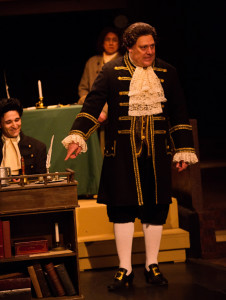
There have already been some great reactions from the audience linked to this atmosphere early in the run. One night near the end of the show— during that fateful moment where a certain individual has to make a momentous decision of yea or nay— from the way I’m situated I can see right behind him into the audience. And there is this kid who is just so excited, hitting his fists on the table, jumping up and down, chanting “come on, come on!” He was really into it! I mean, we know how it’s going to end; this isn’t some M. Night Shyamalan movie with a sudden twist to it. But we must be doing it correctly because these audiences are on the edge of their seats rooting for us. I mean we’ve had audiences start cheering when the declaration gets signed. It’s so great.
Tell us a little bit about the secretary of congress. How does he function in the capacity of the show. How are you similar and different from him and what are you bringing to his characterization from your own personal experience?
Russell: I would say his plot function, or his mechanical function for a lack of a better term, is to keep the decorum of congress moving along. In the show he reads these letters that come in three or four times from General Washington so he serves as an expository device to give the show the context of what is happening outside of congress. One of the themes or the fights of the show is that we have these upper class, cushy men deciding the fate of the country inside their hot hall in Philadelphia, while outside people are fighting and actually dying for that country. A lot of the frustration that some people, including my character, have is that these men are having these long-winded debates and hemming and hawing while people are dying outside. So, I guess a major function that he serves in the show— without having to travel outside of the room and somehow show that on stage, which would be laborious in terms of casting, set, and time— he reads these letters and gives them that context in that way.
And then, of course, the votes. He tallies the votes. Now he’s not technically a member of congress. Well, he’s not a delegate, let’s put it that way. He was the secretary for 15 years. He was there more than most of the delegates in the congress. So even though he doesn’t cast a vote and doesn’t represent a state, though he is from Pennsylvania, he is clearly invested. He spends that much time taking copious notes about the votes and the debates that go on in congress so it very evident that he cares a great deal for this issue.
Do you think he has a standpoint on one side of the debate?
Russell: Oh definitely. Actually that was one of the very first hurdles I had to overcome when cast in this role. In becoming the character of Charles Thomson, my first thought was “he’s the secretary, he’s a stuffy guy that tallies the votes and reads the letters.” End of story. I approached him very much as a plot device without a lot of agency. But then as I researched him, it’s almost like how could I ever have thought that about him? He was born in Ireland; he then emigrated to the United States at a very young age. Both of his parents passed away, one still in Ireland and one on the way. He was basically an orphan upon arrival to the colonies. He was taken in by a blacksmith, a part of the working class in Delaware and then he went to school in Pennsylvania. He taught Latin. Someone called him the Samuel Adams of Philadelphia. He was a contemporary of Ben Franklin, and he had opinions about a lot of the Indian-Colonial conflicts; he was a very active proponent of independency in the colonies. He isn’t just this passive, neutral party taking notes. He’s there for a reason.
When I thought about it more, here’s a guy taking notes— very copious, detailed notes— of “treason.” He believed so much in what they were doing that he was willing to be the one to make the documentation of it, knowing full well that these notes could be used as evidence against him if they lose. If he thought it was that important to keep that sort of record going, and had that much confidence in the cause, then he’s no longer this flat secretarial note-lackey. He’s so much more than that. When Rutledge (Dan Felton) says his bit about property, I have this working class background and I want to stand up and say something. Or when they have their fight over this one little paragraph in the declaration— no matter how important that one little issue is— that that fight is going to ruin the whole thing. And I’ve been there for 15 years trying to make it happen, from a passive standpoint and here one little squabble could throw that all away. A lot of my acting is “playing against.” A lot of the fun is wanting to fight the same war but finding ways to not say it but wanting to and having that fight on stage with myself. I’m by myself on stage, in as much as you can be by yourself in a congress with 20 plus other men, but I have my own little desk and I’m mostly secluded. There’s no one else nearby to play off of the way some of the other congressmen have people at their table with whom they silently converse or share looks.
Once I figured out that element of the character, it just snapped into place. Once I respected the character that much and found that angle inside his head, the whole show kind of fell into place for me. What was once this dry, very monotone and uninteresting character transformed and suddenly he had the invested moments you need to be alive on stage. That’s why you do this, to make that discovery.
You talked a little bit about the letters that you read, and he says he feels like George Washington is writing specifically to him. What are you doing to actualize that? How have you developed that relationship in your head to help bring your character to that conclusion and what does that mean to you? Have you ever had a similar experience where you feel like something addressed to a larger entity was being specifically addressed to you?
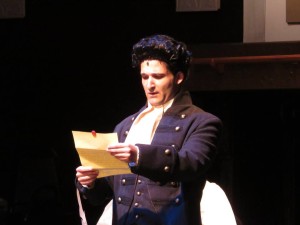
Russell: As I did my research I learned that he was receiving three or four of those dispatches a day. Now in the show there’s only four or five over that span of a few months because, well, we don’t need to spend the entire show reading letters. But in real life, getting that much correspondence on a regular basis from Washington, I’m sure he must have very quickly felt like they were specifically to him because after a while how could you not? And I’m sure sometimes they were very dry things like troop reports, supply reports and things of that nature. But after a while it must have felt like this very intimate thing, getting letters every day from this person, it becomes a reality. Thomson is the one reading them.
A lot of people in congress debate and talk about George Washington and the soldiers as either it not being their problem because it’s a Massachusetts problem or it’s not their problem because it’s happening out there, it’s not real. Whereas for my character it is real. A lot of my frustration comes into play because I really care about George Washington. I want him to succeed and I feel like he’s out there on the front lines and can’t these guys get over themselves and help him? Why are we wasting time debating this stuff while people are out there dying? I think that’s a lot of what happens to Thomson as he takes on that fight for himself. No one else will. Everyone else in Congress has their own agenda. Only Thomson feels like he’s getting it; he’s the only one who feels like he cares about what’s happening to George Washington.
There’s that great line in Act II when Adams (John Adams, played by Jeffrey Shankle) asks Thomson “do you stand with Dickinson or do you stand with me?” And he says “I stand with the General.” Why are you wasting time on these petty squabbles while George Washington is asking you for help? That’s what you should be caring about. That’s how I internalized that; Thomson is the fighter for George Washington, he is his voice of representation within the congress.
Now as far as having a personal similar experience? That’s a really interesting question. Nothing is immediately coming to mind. I honestly can’t think of a situation. I’m sure there must have been situations like that at some point in my life, but I’m really having trouble thinking of something.
What do you think the topical relevancy of this show is for the masses that are seeing it right now?
Russell: I think there is a danger with this show that people might see it as kind of a history channel on stage sort of thing. But I think that one of the thoughts that keeps coming back to me as we do this show and as we talk about this show is that at the end of the day, we’re here. The USA is here. It happened. But at the time, these people were insurgents. They were seen as treasonists; they were committing treason against the crown. If they had lost they would have been hanged. You can definitely draw parallels to a lot of what has happened all around the world; a lot of countries are experiencing their own revolutions right now. I don’t know if the show itself intentionally draws parallels or is trying to make a statement like that but I think that for people watching CNN or watching BBC or watching what is happening around the world right now, it’s a nice reminder that we started there too. Over 200 years ago we were in the exact same boat. I think it’s a nice reminder that everyone has to start somewhere. Even though we’re very established and comfortable now, it wasn’t always that way. So if that helps people support or view what is happening in some of these other countries in a different light then that’s probably a pretty positive thing.
You talked about one of the first challenges you got over was realizing that Thomson was more than a static character of the plot’s devices, but what would you say was one of the biggest challenges for you in this role?
Russell: I would say that emotionally, or dramatically that was the biggest challenge; overcoming or dismissing that preconception of him as just a mouthpiece. All the dialogue is written for him. Of course you memorize everything in the script just in case there’s a rainy day and one of my letters goes missing but normally I read them off the paper, and the declaration is there to read, so on a technical level it’s pretty simple in that regard. The language I think is the trap. Even though you have the words in front of you, and you’re memorized through and through, the language is different from what you’re used to on a daily basis. It is language that is a little archaic? Old-timey? No. Old-fashioned. The language is old-fashioned and does not flow in the way that modern speech flows. So trying to find the flow and trying to find the active words was really difficult. And then you couple that with not falling into the trap of it becoming a dictation. Between the letters and the declaration it’s very easy to fall into that trap of “I’m reading a letter.” And I’ve read it 3,000 times, but every audience is hearing it for the very first time. So that was definitely a challenge to avoid that trap. I think I’ve kept it very active for the most part.
I know you don’t really get to sing much of the song “Is Anybody There?” but I want to talk about it with you because you do start it off.
Russell: It’s a nice little mini solo that I perform right before John Adams takes over the number. It’s one of those nice scenes you get in a show where you have a secondary character who an audience member might dismiss for all those superficial reasons I mentioned earlier get his endearing moment. He’s a little stuffy, he scolds people, and it’s easy for him to come off as a bit of a harsh character. But this poignant song creates a nice reversal for the audience to experience and turn their viewpoint on him around.
What has doing this show taught yourself as a performer and as an individual?
Russell: I would say as a performer it has taught me how to keep things fresh. In a lot of shows, especially in the DC theatre scene, you’re often doing them just on the weekends. If you’re lucky you get 20-25 performances. Until you come to Toby’s and then we’re doing what over 80 shows? So a lot of it has really helped me to hone my discipline. It helps me keep it fresh and reminds me of what head space I have to be in to really stay focused and not get comfortable on stage, and not fall into auto-pilot. I would say it’s been a nice challenge for me to really focus on clarity of language with this show. Definitely in the past with previous show, I think I do a really good job of memorizing lines and making good character choices and things like that, but this show has challenged me to focus on how I approach language and make more meaningful decisions when I break down a line reading.
I’ve been challenged by Jeremy and Shawn (Shawn Kettering, Co-Director) to find my active words and make deliberate choice on line pacing. They’ve challenged me to be that specific and that detailed in my line work and I’m not always challenged by directors to be that detailed. I will definitely carry that into my work in the future. Not a lot of singing and dancing in this show that hasn’t been an issue. I haven’t really had to wear a wig before. I wore a couple of wigs in Bat Boy, but nothing quite like this. This show has taught me how to wear an elaborate wig, sit properly from the 1700’s with good posture, and all of those little nuances.
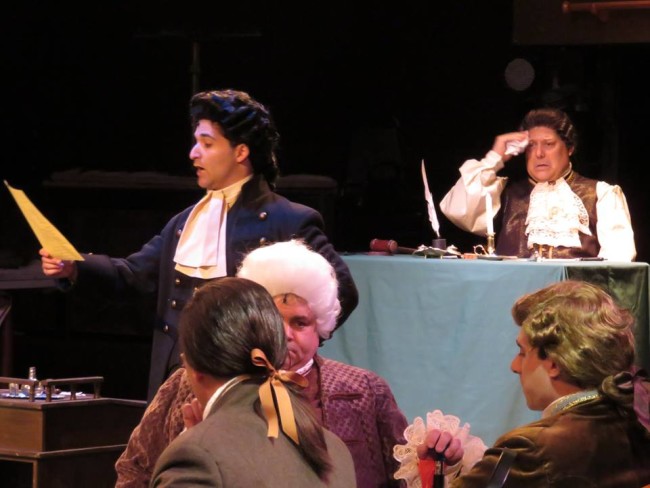
This is going to sound unrelated to the acting but working at Toby’s has taught me how to wait tables. I know it goes against the actor stereotype but I’ve never waited tables before. But there is this element of having to do the dinner part of it before you do the theatre part of it, the ability to get there three hours early, deal with the chaos and stress and hubbub of waiting tables and then have to in literally a half an hour transition from that level of stress and craziness into doing the show— that has been a huge lesson. And instead of getting to breathe through intermission like most performers in other theatres, you’re right back out on the floor doing the waiter role. I had never waited tables in my life before. So this isn’t like I had done Applebees when I was younger or anything. This has been a huge learning experience for me.
Waiting tables has been almost more difficult than acting in the show. I’ve been acting in DC for five years now. So that was almost old hat by comparison to learning how to wait tables. It’s a lot of structuring in your mind of who ordered what, and multi-tasking through different tables. The ability to balance the waiting aspect and the acting aspect is a new skill that I’m still working at and hopefully I’ll keep getting better at it. Much respect to guys like David, Jeffrey, and Larry;(David James, Jeffrey Shankle, Lawrence B. Munsey playing McNair, John Addams, and John Hancock respectively) to all those guys who have been there doing this for years and just go out there and do it. It’s amazing.
And I want to say, since we’re mentioning some of these veteran performers. This is my first show at Toby’s and they are all just so welcoming. In the dressing room I’m in the “gentlemen’s corner.” Well, actually our two ladies are there, so we’ll have to call it the veteran’s corner. But it’s Darren and Jeff and Larry (Darren McDonnell, playing John Dickinson.) and then there’s me. And they are all just so warm and welcoming and wonderful.
Talk to us very quickly about the relationship between Thomson and the president of Congress?
Russell: It’s been great because he and I are the only ones over there and luckily we click. And then off-stage we go out and hang out together. Actually a lot of us in the cast do. But Larry and I sit close in the dressing room, and we’ve really bonded. It’s been great to have a Toby’s veteran take me under his wing and make sure I’m out on stage at the right time. He’s been really great, just like Thomson and Hancock.
If you had to be a founding father, who would you be?
Russell: Ooh. Well, definitely Benjamin Franklin, though I’m sure everybody probably says that. Let me modify that to Thomas Jefferson. He was like the ultimate Renaissance man. A good friend of mine who went to college with me was a presidential scholar, went to college for museum studies and I think her thesis was in presidential assassinations and attempts. Her favorite president is Jefferson so I went with her down to Monticello and we took the tour. He invented this calendar thing in his house so when you walk into Monticello there is a counterweight system over top of the main door that is perfectly balanced to tell you what day it is. The roof on Monticello is another invention of his, designed to irrigate water correctly. He was into agriculture, he played the violin. He invented his own beer recipes. And, of course, he’s a legendary writer. He really is the ultimate Renaissance man, so it’s a close call between him and Franklin, but let me reiterate that he invented his own beer recipes. So I think I have to go with Thomas Jefferson, actually. That should make my friend very happy.
How do you think the founding fathers would feel if they came to see 1776 at Toby’s?
Russell: Hmm. That’s an interesting question. I’d say proud. They’d be a little surprised because they might not expect their great experiment of independence to have lasted as long as it did, I don’t think they anticipated that. So maybe humbled by the reverence that is being given to them. Why are we so important that a show has been written about us? Maybe a little weirded out because they see people playing them on stage, so I imagine a little of that might be going on. Probably a little confused by all the cell phones, what are these crazy new-fangled devices? I think they would enjoy the food, especially Franklin. And he’d definitely enjoy the alcohol. I think they’d be confused by all the singing because they weren’t singing back then, musical theatre hadn’t really been invented over here yet. But especially people like Franklin and Jefferson would be entertained and honored by the production. Jefferson might join in and start playing the violin for the show.
1776 is a fascinating musical but there are many other theatrical engagements across Washington DC and Baltimore that would very much like to tie up theatergoers time and money, so why come to Toby’s to see 1776?
Russell: We are in the nation’s capitol. We’re right here. What better place to come and see a show about the founding fathers? You can literally go to DC, see the actual Declaration of Independence at the archives, and then come up to Columbia and see a show about it. I’ve been asking a lot of the student groups that come through if they’ve been to the archives yet on their trip. Especially with July 4th coming up, I can’t imagine a better idea than to come and see this show for that holiday. I mean we’re pretty much running in real time here with the show, we started a little early. May 8th is the first date on the board in the show and congress goes through July 4th, and here this show closes July 5th. Just that alone, living in DC you can get a little jaded being constantly surrounded by the history, but having such a historical event dramatized almost in real time? It’s great.
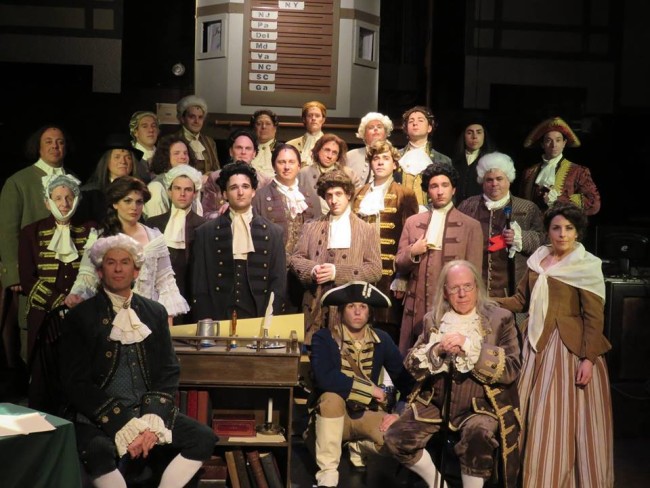
Plus there’s great acting occurring on that stage. John Stevenson as Ben Franklin is Ben Franklin incarnate. The music is great. “He Plays the Violin,” “The Egg,” “Mister Adams,” it’s awesome. I think a lot of people forget how great the music in this show really is and when they come to see it they are suddenly reminded of that. They get that smile on their face when they remember how good it sounds. It’s a nice patriotic reminder, as well. It’s a jolt of red, white, and blue to that part of your body and soul. There’s a certain pride you get from watching this show.
What is the message that you are hoping people will take away from seeing 1776?
Russell: I think a good message to take away from this show is that it wasn’t easy. Don’t take what we have for granted. We’ve achieved a modern day mentality of “it’s here, we’re free” and people forget that that came with struggle. There was struggle. There was sacrifice to make what we have happen. It can be very easy, as a lot of us were born into this pre-existing free country, to forget just how much it took to get us here. If they can take away that appreciation, that will be really nice.
1776 plays through July 5, 2015 at Toby’s the Dinner Theatre of Columbia— 5900 Symphony Woods Road in Columbia, MD. For tickets please call (301) 596-6161 or purchase them online.
To read the review of 1776, click here.
To read Part 1 of Inside Independence Hall: An Interview with Co-Director Jeremy Scott Blaustein, click here.
To read Part 2 of Inside Independence Hall: An Interview with David James and Matthew Hirsh, click here.

